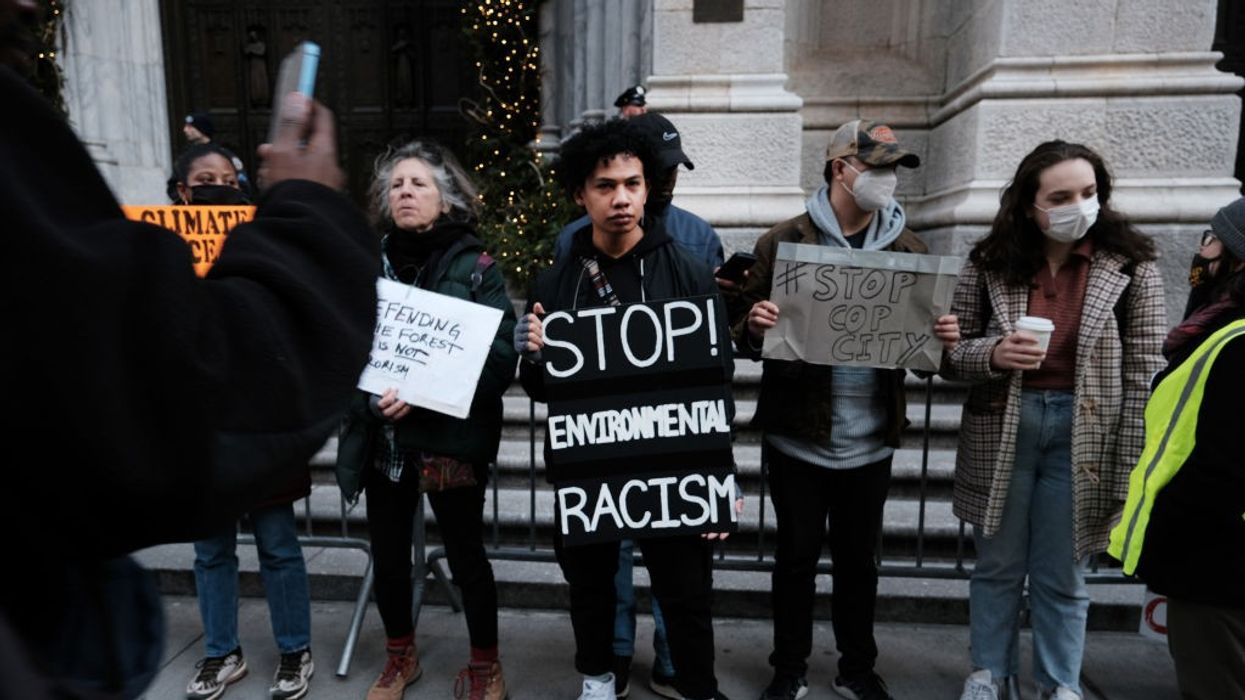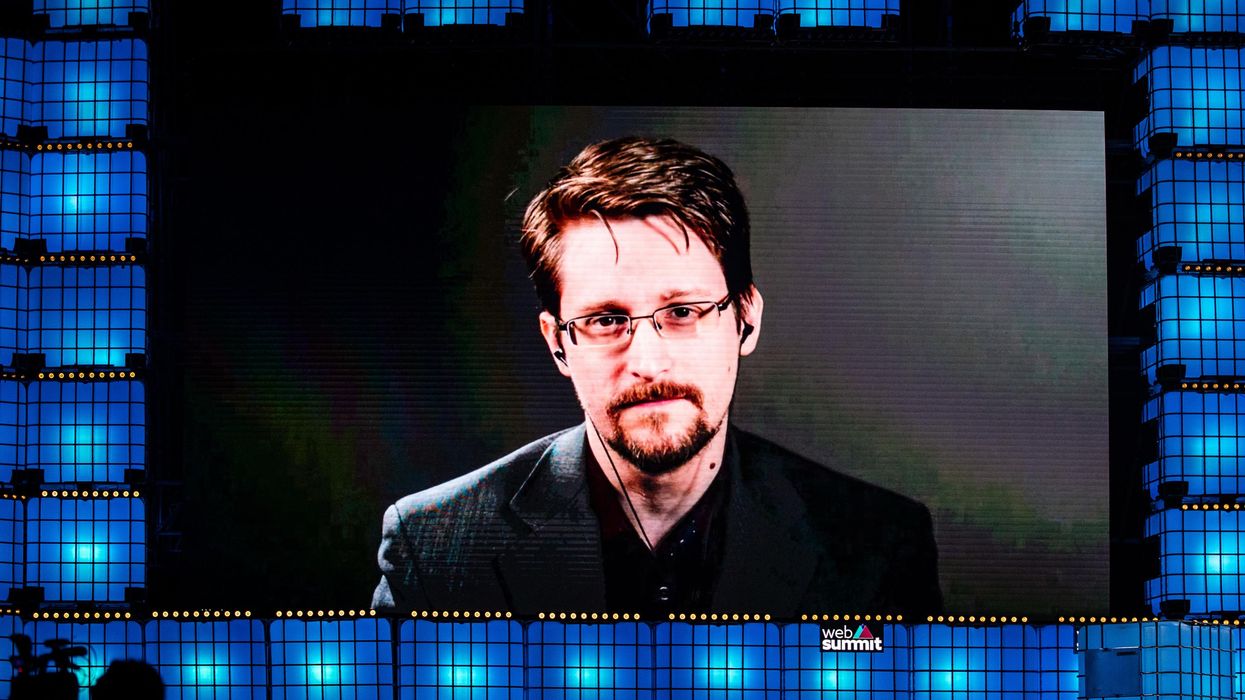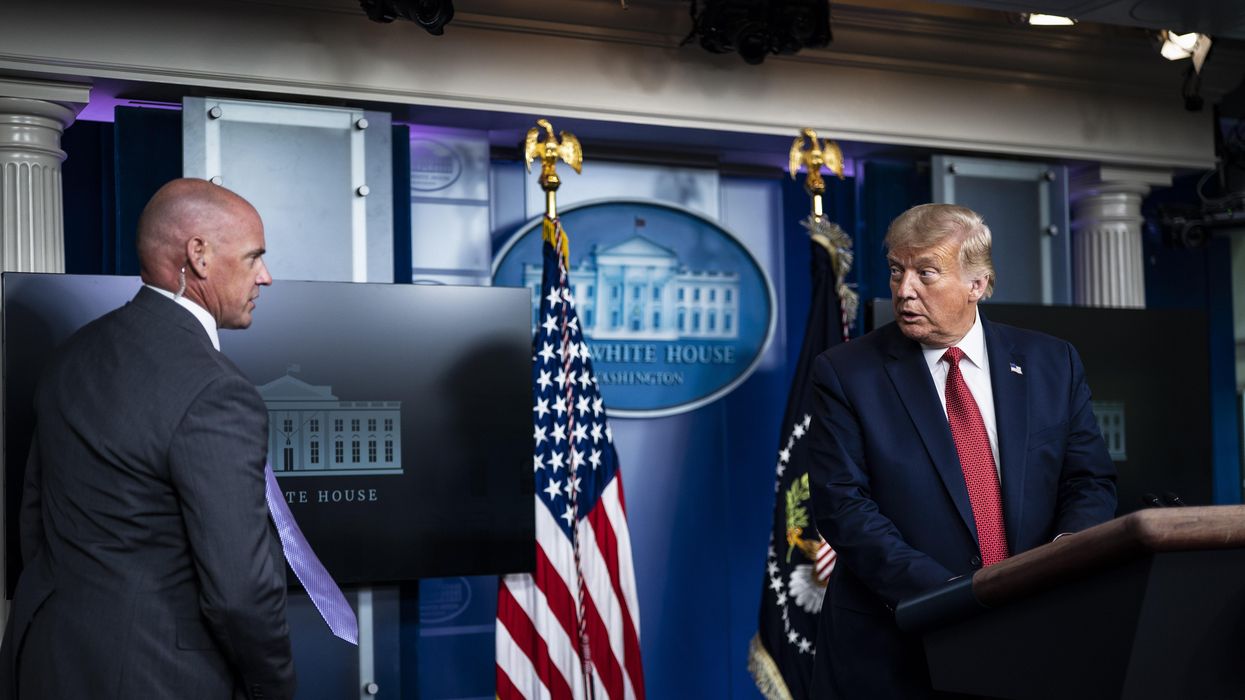Notes from the Frontlines of the Government’s War on the Left
In a real sense, the latest version of American inquisition has simply come full circle, returning us to our historical roots.
“There must be some kind of way out of here…”
As night fell over the South River Forest, the music festival was in full swing. Young and old swayed to the sounds of Suede Cassidy. Families gathered around the grill. Little ones frolicked in an inflatable bouncy house bedecked with a banner that read: “Stop Cop City.”
While the band played on, a strike force of Georgia state troopers assembled in the shadows. They were there to clear the way for the creation of the Atlanta Public Safety Training Center, better known as “Cop City,” a $90-million training ground for the future of urban warfare. It would destroy more than half of that urban forest. For years, the project had faced mounting local opposition and this festival was, in essence, a coming-out party for the movement to defend a priceless bit of urban green space from the bulldozer’s blade.
Now, accompanied by the dull hum of drones and the buzz of helicopters overhead, officers of the “peace” descended from all directions, their fingers on the triggers of their semi-automatics. The orders came down with the force of live rounds: “Get on the ground! Now!”
“I was completely shocked when I heard that I was being charged with domestic terrorism.”
“I was playing ‘All Along the Watchtower,’ funnily enough,” remembers Suede Cassidy frontman Jeremiah Percival. “Around halfway through our set, they started arresting people… pointing AR-15s… traumatizing kids for nothing. It was very stormtrooper-esque. It’s a good reminder to know how fascism is in this country and how it’s very much alive.”
“It was after dark,” recalls Stop Cop City activist Priscilla Grim. “I was walking to see the concert. And I noticed that there was a drone tracking me. And the next thing I knew, men started chasing me, and I fell. They had me turn over on my stomach. And there was the red light of the gunsight to the right of my head. It was… frightening!”
Priscilla and 22 other protesters nabbed that night would go on to be charged with “domestic terrorism”—conduct allegedly “intended to intimidate the civilian population” or to “alter, change, or coerce the policy of the government of this state”—under a Georgia statute originally meant to deter would-be killers in the wake of the Charleston A.M.E. massacre. “I was completely shocked when I heard that I was being charged with domestic terrorism,” Priscilla told me. “For wearing black! In a forest! It’s absurd. It’s illegitimate. It’s an abuse… And as a survivor of 9/11, I am insulted that the state of Georgia thinks that they can do this.”
The Makings of an American Inquisition
Today, no fewer than 42 such cases are being prosecuted by Georgia’s attorney general. All 42 defendants stand accused of damaging property, not people. The only injuries that occurred were by police and correctional officers on the bodies of the accused. Some were then held for a month or more before being formally charged with a crime.
Georgia is hardly alone. The New York City Police Department recently attempted to charge multiple protesters with “terrorism” after they peacefully occupied a subway station to protest the choking to death of Jordan Neely, an unhoused New Yorker, by an ex-Marine. In an absurd turn of events, the charges were ultimately downgraded from “terrorism” to “criminal trespassing” before being dropped altogether last week.
Though the fanatics of the far right have been responsible for the preponderance of deadly political violence in recent years, it’s the heretics of the left—antiracists and antifascists, environmentalists and anticapitalists, pro-choice feminists and LGBTQ+ liberationists—who have attracted the most attention from police, prosecutors, and inquisitorial politicians.
And across the country, such police work continues under the guise of counterterrorism. Since the George Floyd movement, it’s been possible to see the makings of a future American inquisition in which the machinery of state is increasingly weaponized against the body politic itself—especially against its most leftwing, most marginalized parts.
Though the fanatics of the far right have been responsible for the preponderance of deadly political violence in recent years, it’s the heretics of the left—antiracists and antifascists, environmentalists and anticapitalists, pro-choice feminists and LGBTQ+ liberationists—who have attracted the most attention from police, prosecutors, and inquisitorial politicians.
It is they who have been profiled as “domestic terrorists,” branded as “violent extremists,” and subjected to terrorism-based sentencing enhancements, often yielding harsher prison terms and crueler punishments than those for their right-wing counterparts. As a result of such disparities, hundreds of participants in the George Floyd protests remain caged in federal facilities to this day.
The Long, Hot Summer of 2020
On May 31, 2020, just days after George Floyd’s murder, President Trump’s Department of Justice (DOJ) all but declared war on the burgeoning racial-justice movement. Attorney General William P. Barr went before the press and promised to deploy federal forces to apprehend “radical agitators,” identify “criminal organizers and instigators,” and “coordinate” with “our state and local partners.”
“The rioting is domestic terrorism,” Barr went on to state, “and will be treated accordingly.”
Acting Deputy Secretary of Homeland Security (DHS) Ken Cuccinelli had a nearly identical message for the media: “Cities across America burn at the hands of antifa and anarchists while many political leaders are refusing to call it what it is: domestic terrorism.” A DHS whistleblower later affirmed that Cuccinelli and others had specifically instructed him to play up “the prominence of violent ‘left-wing’ groups” in his intelligence assessments—and downplay threats of terror from the far right.
In two particularly egregious cases, U.S. Marshals and their deputies functionally acted as judges, juries, and executioners, with “Violent Offender Task Forces” fatally shooting two suspects—antifascist activist Michael Reinoehl in Washington and Black Lives Matter advocate Winston Smith in Minnesota—on sight
And so began a long, hot summer of inquisition into, and counterinsurgency against, the Black Lives Matter movement. By the second week of June, more than 13,643 protest participants had been arrested by state and local authorities. Some, like a group of three teens in Oklahoma City, even faced charges of felony “terrorism” for alleged acts of property destruction.
By the time the protests were over, some 326 people had been apprehended by federal agents, including members of the Federal Bureau of Investigation, the Bureau of Alcohol, Tobacco, and Firearms, and DHS’ Border Patrol Tactical Unit. At least 54 U.S. Attorneys’ offices were involved, as were all 56 of the FBI’s Joint Terrorism Task Forces.
In May 2023, new reporting on FBI activities would reveal that the agency had improperly run “batch queries” of foreign intelligence sources for information on 133 individuals, all of whom were arrested “in connection with civil unrest and protests” in 2020. They were looking for “counter-terrorism derogatory information on the arrestees.” According to recently declassified documents from the Foreign Intelligence Surveillance Court, they were also spying on American citizens without “any specific potential connections to terrorist-related activity.”
In 20 of the cases prosecuted at the federal level, there is evidence of direct involvement by FBI agents in the arrests themselves. And in two particularly egregious cases, U.S. Marshals and their deputies functionally acted as judges, juries, and executioners, with “Violent Offender Task Forces” fatally shooting two suspects—antifascist activist Michael Reinoehl in Washington and Black Lives Matter advocate Winston Smith in Minnesota—on sight.
Up until January 6, 2021, the supposed danger posed by left-wing “extremism” continued to be deemed greater than, or at least equal to, the threat of right-wing terrorism. No matter that the right had been responsible for the lion’s share of lethal incidents linked to extremism of any kind.
There were, of course, no terrorism bulletins released ahead of the events of January 6. Nor would there be terrorism enhancements after the fact awaiting those who participated in the Capitol siege. Such charges were reserved for Americans of a different description.
A Bipartisan Inquisition
The inquisition did not end with Trump’s first term. For all the rhetoric about criminal justice reform—and for all the conspiracy theories claiming that the president had “quietly” pardoned thousands of Black Lives Matter protesters in 2021—Joe Biden’s DOJ has doubled down in a determined fashion on an inquisitorial strategy of counterinsurgency in the name of counterterrorism.
In the White House’s “National Strategy for Countering Domestic Terrorism,” released in June 2021, the administration pledged to “disrupt and deter those who launch… attacks in a misguided effort to force change in government policies that they view as unjust.” Subsequent documents, like last fall’s “Strategic Intelligence Assessment,” a joint product of the FBI and the DHS, confirmed what many in the Black Lives Matter movement already knew: that federal intelligence agencies had set their sights on “threat actors” motivated by “real or perceived racism or injustice in American society.”
Over the course of the Biden presidency, the DOJ has prosecuted Trump-era protest crimes with vigor and enthusiasm, while federal prosecutors have expanded the use of terrorism sentencing enhancements, delivering dozens of political prisoners to the doorstep of the Federal Bureau of Prisons. A grossly disproportionate share of them have been people of African descent.
Though many have seen their charges dropped, others have seen their cases pursued to the bitter end by local prosecutors.
The vast majority of federal cases involve offenses against property or “commerce.” At least 17 have faced felony charges for unlawful use of the Internet (for instance, “using an instrument of interstate commerce to incite riots”). One of every three defendants was charged with obstructing “interstate commerce,” one in five with crimes of “civil disorder,” and another one in five for “conspiring,” “attempting,” or “aiding and abetting” some underlying crime they did not themselves commit.
Take the case of a young Black woman named Tia Pugh, of Mobile, Alabama, who was initially charged with two simple misdemeanors for breaking a window on the night of May 31, 2020.
“We were attacked first,” she would recall. “I was getting my people out of there… We get killed for less.” After being tracked down on Facebook, then interrogated by the FBI, she was brought up on felony charges for interfering with the police “during the commission of a civil disorder” which “adversely affected commerce.” Facing more than five years in prison, her sentence was reduced to time served after she spent more than a year in pretrial detention in an Alabama jail.
Though many have seen their charges dropped, others have seen their cases pursued to the bitter end by local prosecutors. Black activist Brittany Martin was, for instance, convicted in 2022 of “breaching the peace” for shouting in officers’ faces during a peaceable assembly in Sumter, South Carolina, in 2020. Although the alleged offense typically carries a maximum penalty of 30 days, prosecutors charged her with a crime of a “high and aggravated nature.” Last spring, she was sentenced, while pregnant, to no fewer than four years behind bars.
Future Enemies of the State
By any measure, the white supremacist movement is now officially acknowledged to pose the deadliest terrorist threat in America. The White House, the DOJ, and the DHS have made much of their commitment to confronting such far-right forms of terror, but the numbers coming from the federal government tell a different story.
On June 6, the DOJ’s Office of the Inspector General released its annual internal audit, assessing the department’s strategy to “address the domestic violent extremism threat.” The audit revealed that investigations into white supremacist, “racially motivated,” and “anti-government/anti-authority” activity fell dramatically from 2021 to 2022. At the same time, the number (and share) of investigations involving “abortion-related” (including “pro-choice”) extremism skyrocketed, increasing by more than 800% and surpassing that recorded in any other year on record.
There is little mystery as to who is being targeted by such investigations since the Dobbs v. Jackson Women’s Health decision, which revoked a pregnant parent’s right to choose. Last year, FBI Director Christopher Wray clarified which side was the most suspect and which side considered the most victimized: “You might be interested to know that, since the Dobbs decision, probably in the neighborhood of 70% of our abortion-related violence cases, are cases of violence or threats against pro-life… where the victims are pro-life organizations. And we’re going after that.”
“I was shocked that the FBI would be interested in us this way… Community organizing is not illegal and should not be treated as such.”
The case of Pilsen Community Books (PCB), a worker-owned bookstore on Chicago’s Lower West Side, is illuminating in this regard. PCB was recently revealed to be the subject of an FBI “assessment,” based on three factors: its status as a “not police friendly place”; its role as a “meeting, planning, and networking venue”; and its recent use by “pro-abortion extremists… to prepare for a pro-abortion direct action.” In other words, it’s a dangerous hotbed of constitutionally protected activity.
“Everything is very much out there in terms of what we believe and what we do,” says worker-owner Mandy Medley. “I was shocked that the FBI would be interested in us this way… Community organizing is not illegal and should not be treated as such.”
Elsewhere, the Department of Homeland Security and its national network of 80 “fusion centers” have been hard at work collecting and aggregating data on “anarchist” or “environmental violent extremists.” And they’ve cast a wide net, even ensnaring writers and artists in their web of surveillance.
State Terror in the Age of Counterterrorism
Meanwhile, back in Washington, D.C., inquisitorially-minded Republican politicians have been pressuring the FBI and DHS to crack down ever harder on their ideological adversaries. Last month, Marjorie Taylor Greene (R-Ga.) introduced legislation that would designate “Antifa,” and “any other affiliated group or subsidiary of Antifa” to be a domestic terrorist organization based on its “unlawful conduct” and its belief in “communism, anarchism, socialism… and lawlessness.” That same month, the House Committee on Homeland Security held a hearing on “Countering Left-Wing Organized Violence,” at which Greene called for a clampdown on the newest enemy of the state: “The movement that wants to use trans terrorism against Americans.” No mention was made of the very real movement that approves of the use of terror against trans Americans.
One such trans American was Manuel Terán, an Indigenous forest defender known as Tortuguita, who was killed by a barrage of 57 bullets one cold January day in that Atlanta forest. While it was a state trooper who fired the fatal bullet, it was DHS, the FBI, and the Georgia Bureau of Investigation that provided the intelligence for the operation. In the months since Tortuguita’s killing, those very agencies have continued to beat the drums of war, warning of the threat of “violent extremists in Georgia” and singling out those motivated by “anti-law enforcement sentiment.”
In a real sense, it may be that this latest American inquisition has simply come full circle, returning us to our historical roots: to a society where the caging of Black people, the spilling of Indigenous blood, and the violent policing of the body politic are the stuff of business as usual—a society where state terror, in the name of counterterrorism, is accepted as a way of life.
On the other hand, if Black Lives Matter and the movement for bodily autonomy are any indication, it may be that we, as a society, have a lower tolerance for state terror than we once did.


